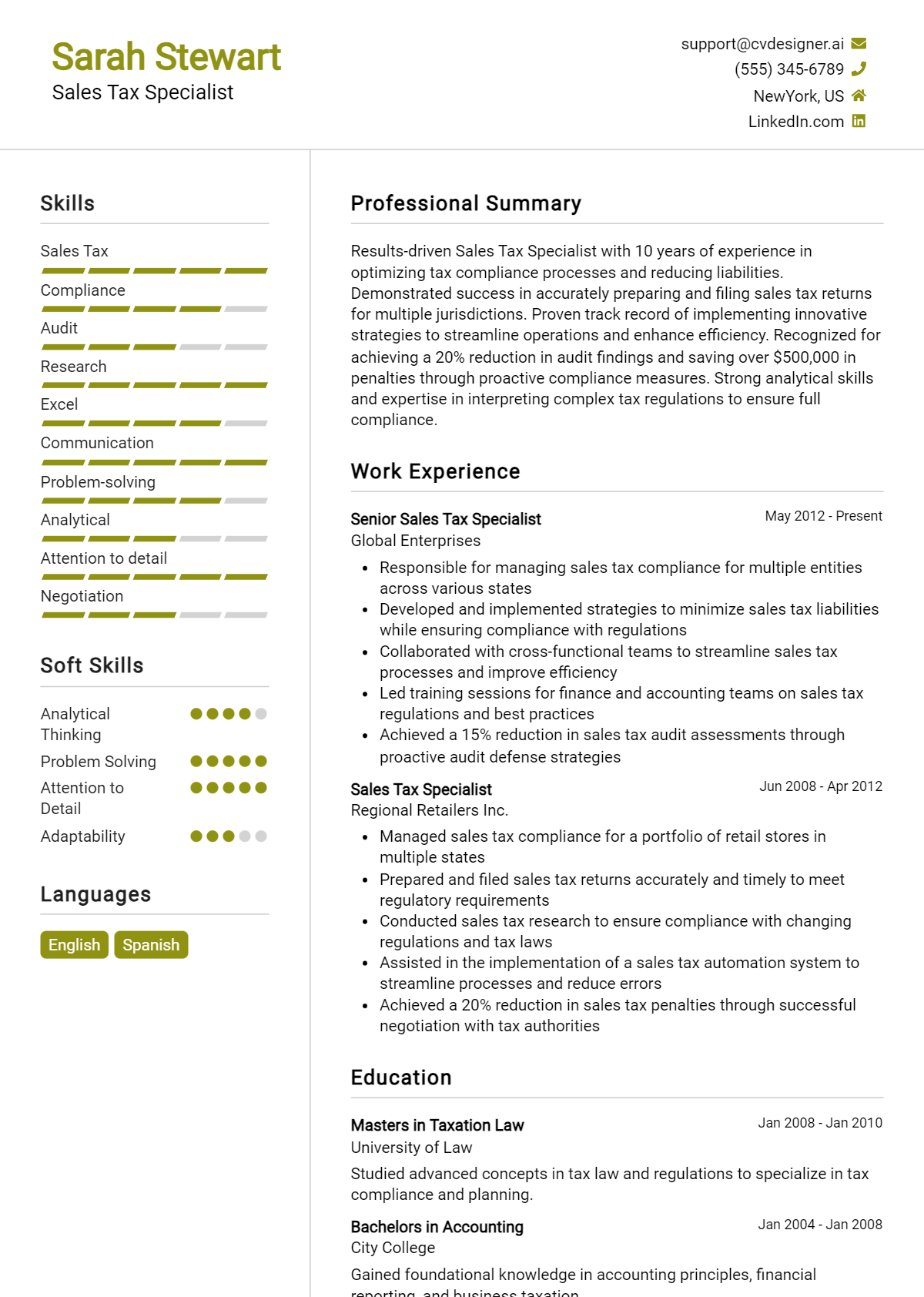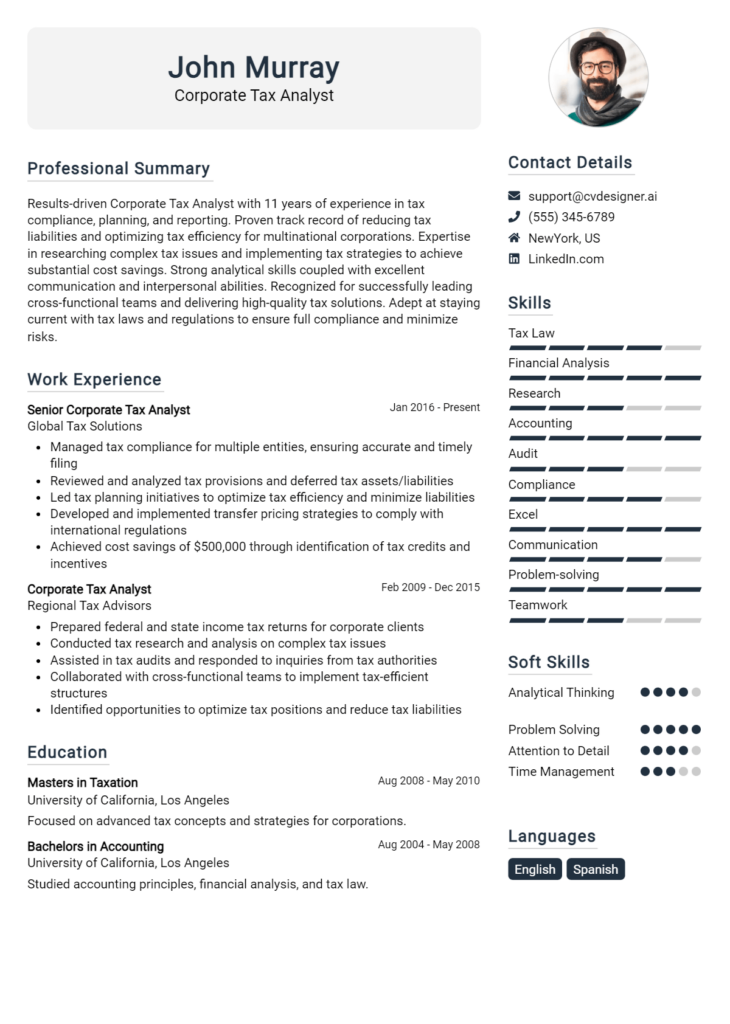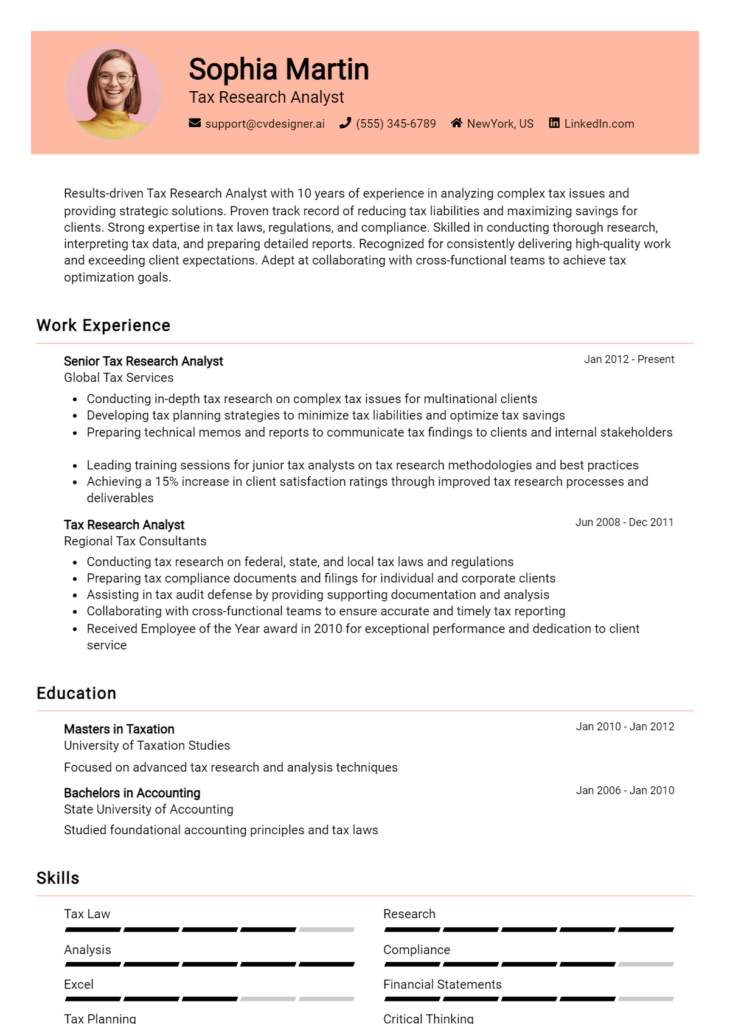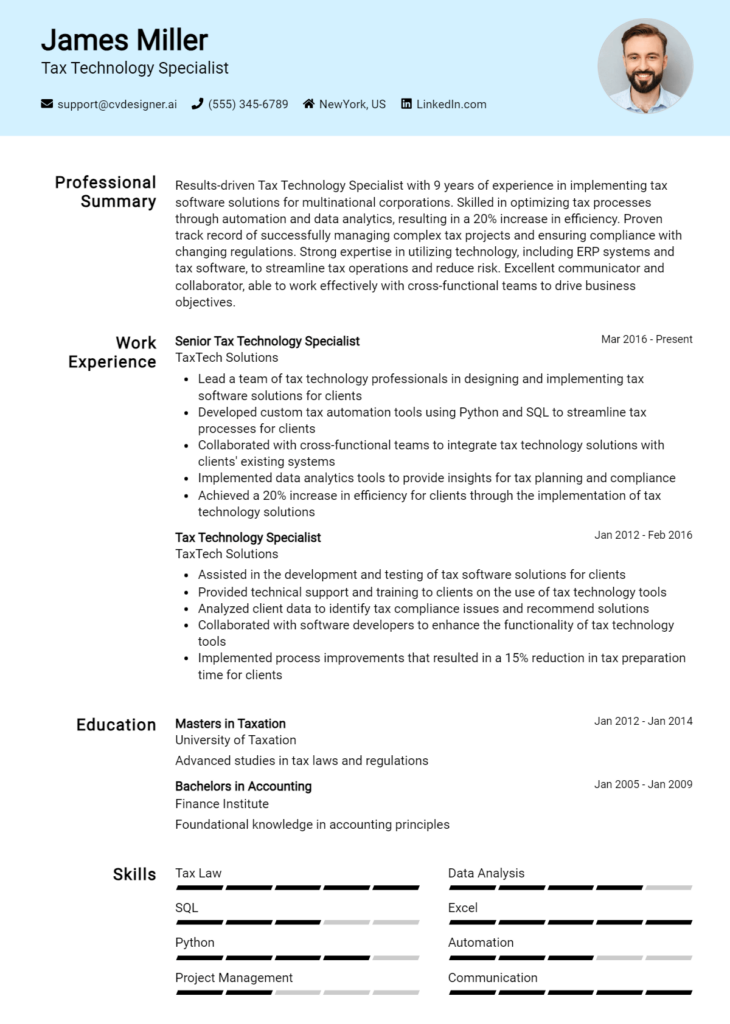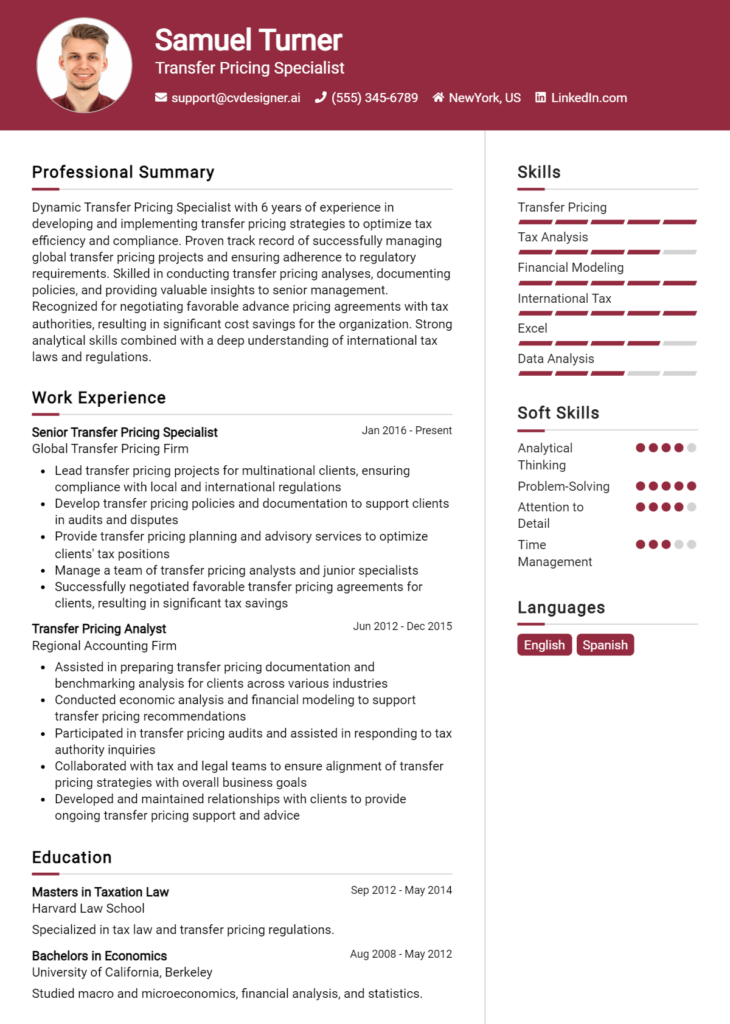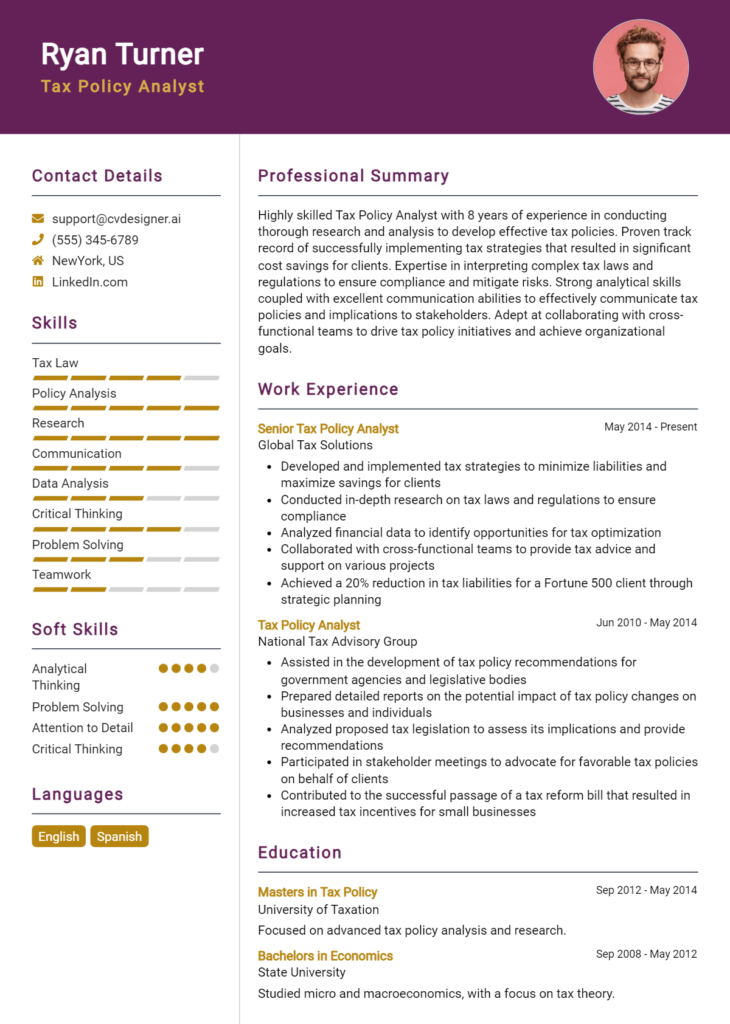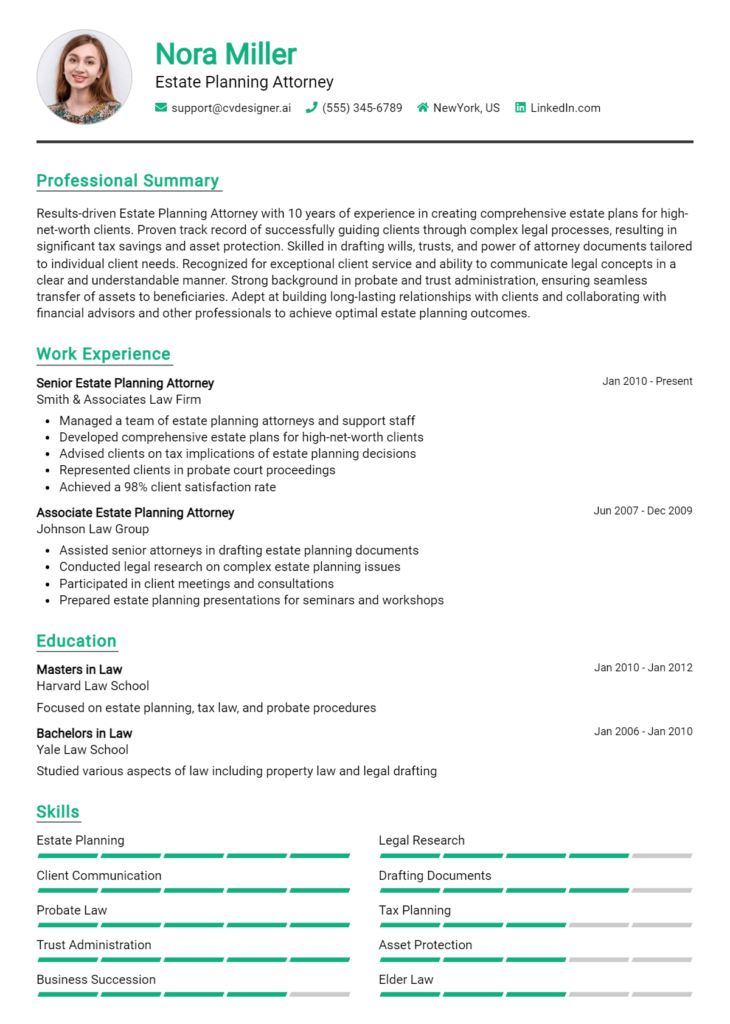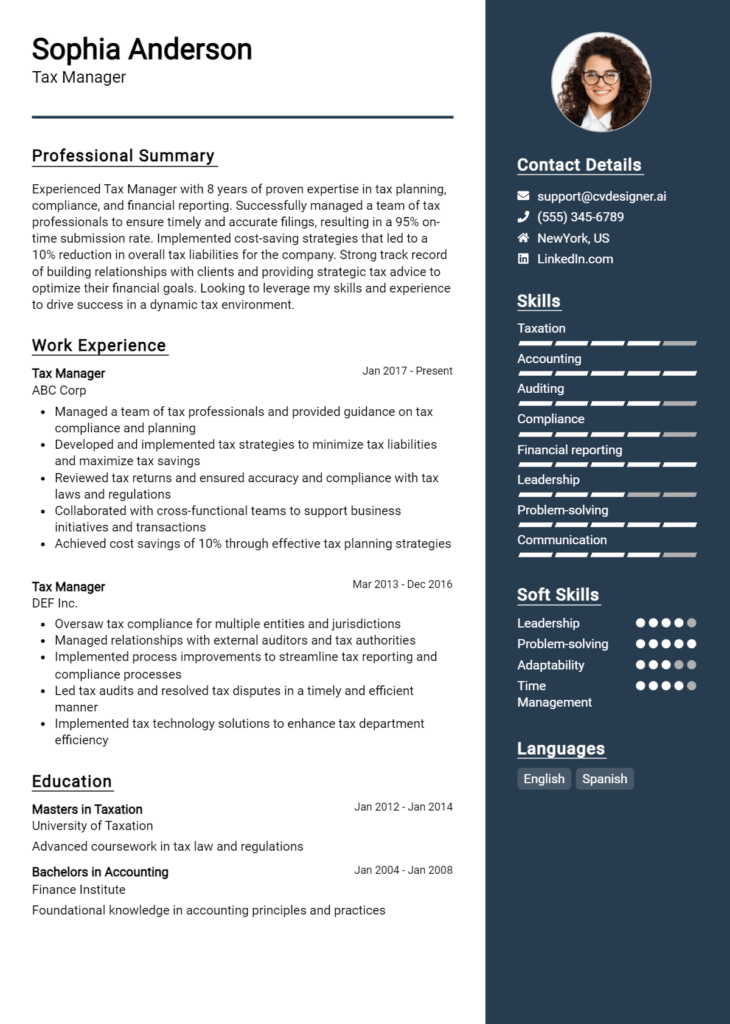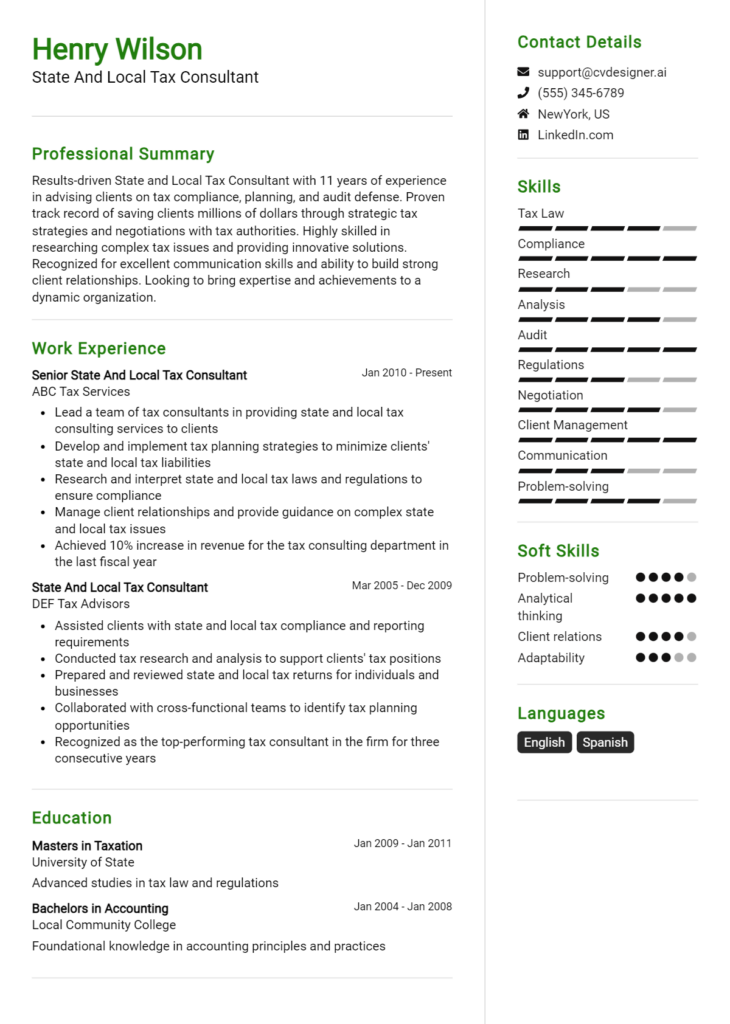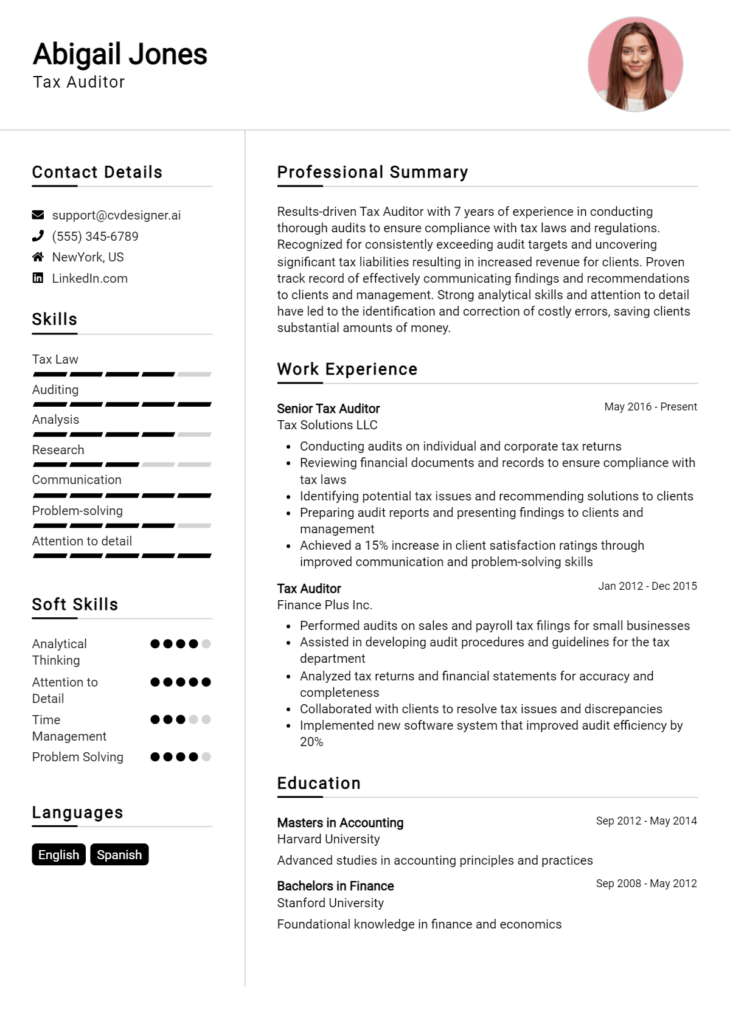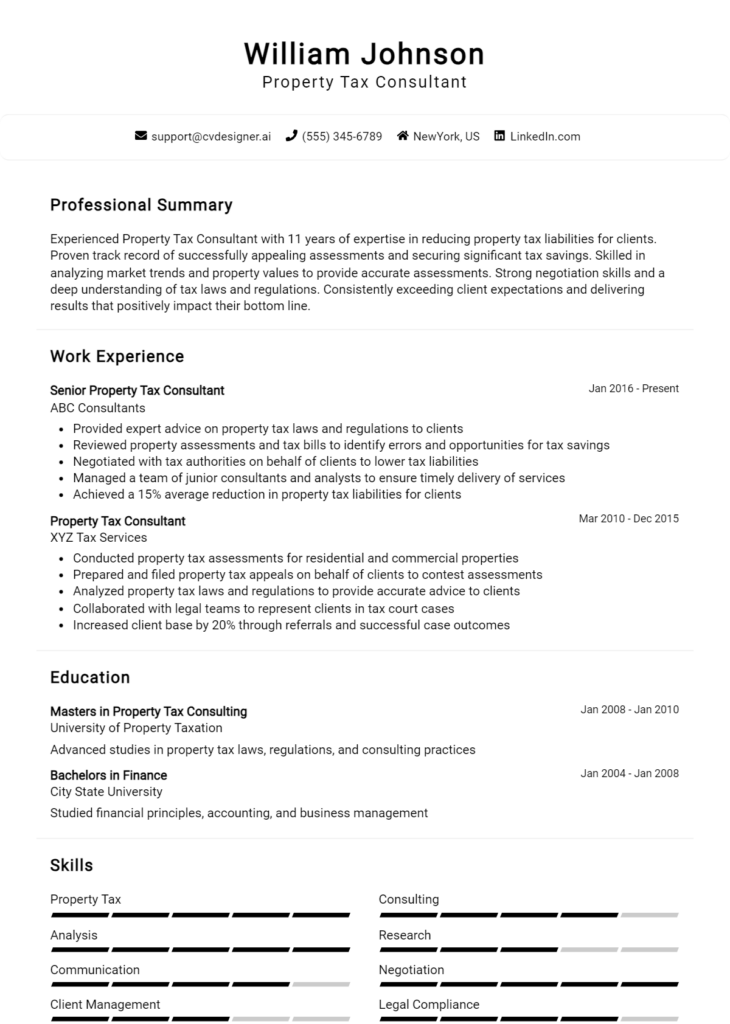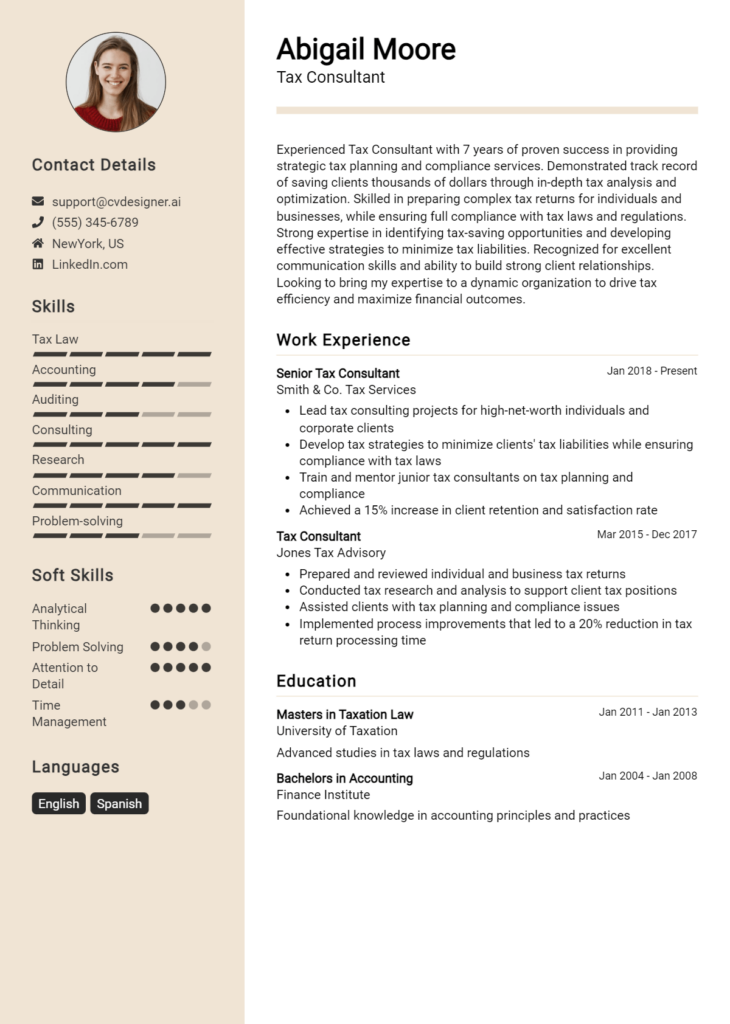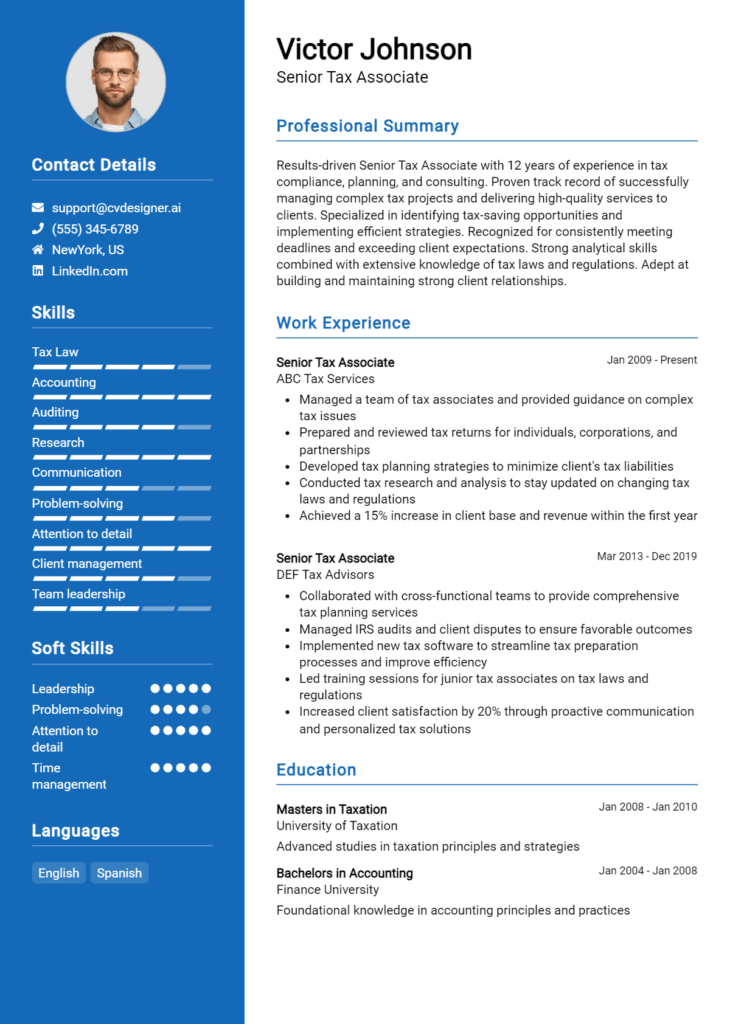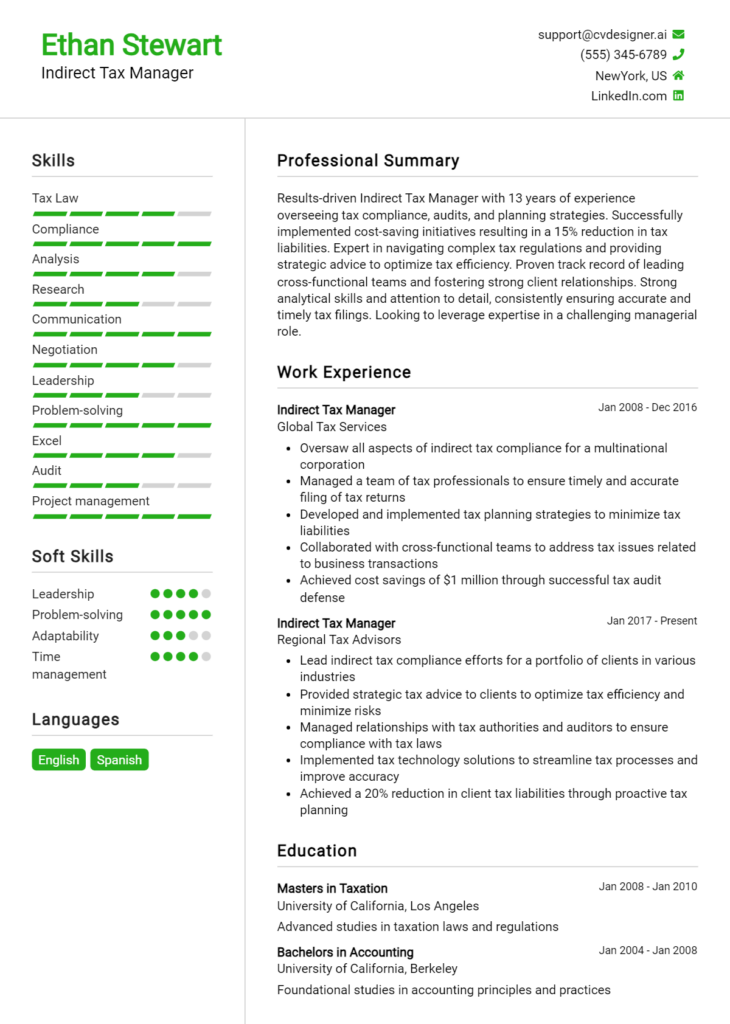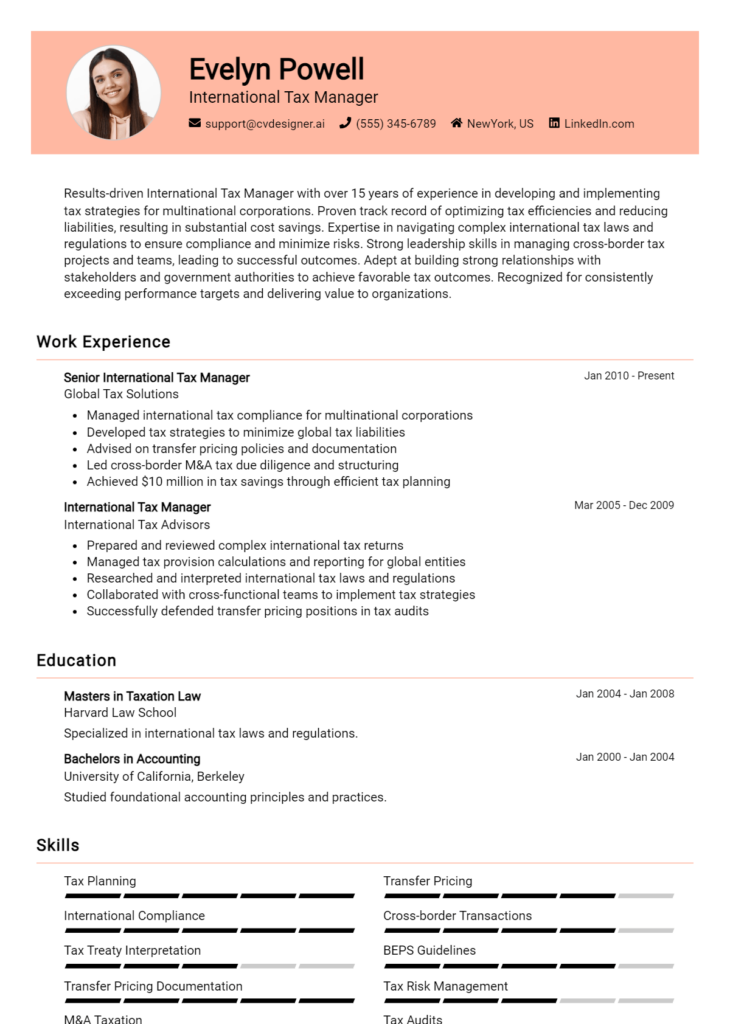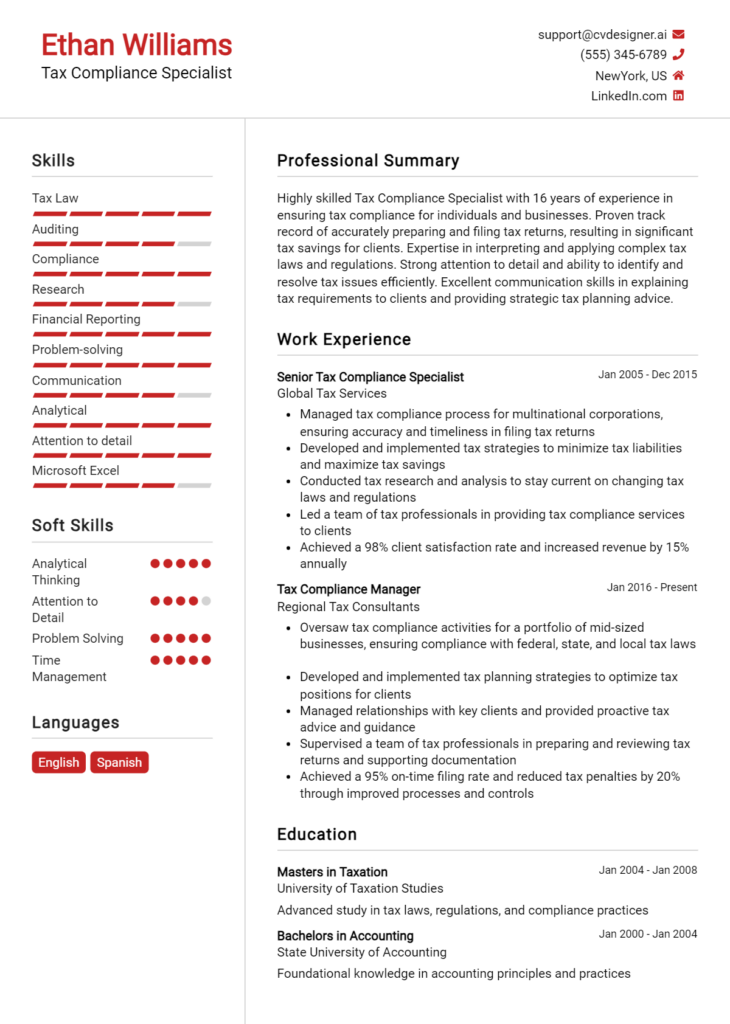Sales Tax Specialist Core Responsibilities
A Sales Tax Specialist plays a crucial role in managing and ensuring compliance with sales tax regulations across various departments. This position requires strong analytical skills to interpret tax laws and regulations, alongside operational abilities to implement tax strategies effectively. Problem-solving skills are essential for resolving discrepancies and optimizing sales tax processes. By collaborating with finance, accounting, and legal teams, they contribute to the organization's financial health. A well-structured resume highlighting these technical and operational skills can significantly enhance job prospects.
Common Responsibilities Listed on Sales Tax Specialist Resume
- Ensure compliance with state and local sales tax regulations.
- Prepare and file sales tax returns accurately and timely.
- Conduct sales tax audits and respond to inquiries from tax authorities.
- Analyze sales transactions to determine taxability.
- Collaborate with accounting and finance teams to maintain accurate records.
- Provide training and guidance on sales tax issues to staff.
- Monitor changes in tax laws and assess their impact on the organization.
- Develop and implement sales tax strategies to minimize liabilities.
- Assist in the preparation of year-end tax documentation.
- Support internal and external audits regarding sales tax matters.
- Research and resolve sales tax discrepancies and issues.
High-Level Resume Tips for Sales Tax Specialist Professionals
In today's competitive job market, a well-crafted resume is crucial for Sales Tax Specialist professionals striving to make a lasting impression on potential employers. Your resume often serves as the first point of contact, and it needs to effectively showcase not only your skills and qualifications but also your achievements in the field of sales tax compliance and consulting. A strong resume can open doors to new opportunities, demonstrating your expertise and readiness to tackle the complexities of sales tax regulations. This guide will provide practical and actionable resume tips specifically tailored for Sales Tax Specialist professionals, helping you to present yourself in the best possible light.
Top Resume Tips for Sales Tax Specialist Professionals
- Tailor your resume to match the specific job description, highlighting relevant experience and skills.
- Use industry-specific keywords to pass through Applicant Tracking Systems (ATS) and grab the hiring manager's attention.
- Showcase your experience with sales tax compliance, audits, and research, emphasizing your role in achieving successful outcomes.
- Quantify your achievements, such as the percentage of tax savings generated or the number of successful audits completed.
- Highlight certifications and relevant education, including CPA or CMI, to demonstrate your commitment to the profession.
- Include technical skills such as proficiency with tax software (e.g., Vertex, Avalara) and Excel to set yourself apart.
- Demonstrate your ability to stay updated on changing tax laws and regulations, showcasing any relevant training or seminars attended.
- Use action verbs and concise language to create a clear, impactful narrative of your professional journey.
- Consider including a summary statement that encapsulates your expertise and career goals to grab attention immediately.
Implementing these tips can significantly increase your chances of landing a job in the Sales Tax Specialist field. By presenting a tailored, achievement-focused resume that clearly conveys your qualifications and industry knowledge, you position yourself as a strong candidate capable of contributing to any organization’s tax compliance efforts. Your resume is not just a document; it’s a tool that can facilitate your career advancement.
Why Resume Headlines & Titles are Important for Sales Tax Specialist
In the competitive field of sales tax, a well-crafted resume headline or title serves as a critical first impression for potential employers. For a Sales Tax Specialist, this succinct phrase can immediately capture the attention of hiring managers, offering a snapshot of the candidate's key qualifications and expertise. A strong headline should be concise, relevant, and tailored to the specific job being applied for, helping to ensure that the candidate stands out in a crowded applicant pool. By summarizing their unique selling points effectively, job seekers can pave the way for further consideration in the hiring process.
Best Practices for Crafting Resume Headlines for Sales Tax Specialist
- Keep it concise: Aim for a headline that is brief yet informative, ideally one sentence long.
- Be specific: Tailor the headline to reflect the specific role of Sales Tax Specialist, avoiding generic terms.
- Highlight key qualifications: Focus on the most relevant skills, certifications, or experiences that make you a strong candidate.
- Use impactful language: Choose strong, action-oriented words that convey confidence and competence.
- Incorporate keywords: Use industry-specific terminology and keywords that align with the job description.
- Showcase accomplishments: If possible, include quantifiable achievements to demonstrate your effectiveness in previous roles.
- Match the job description: Align the headline with the specific requirements and responsibilities outlined in the job posting.
- Avoid clichés: Steer clear of overused phrases that can dilute the strength of your headline.
Example Resume Headlines for Sales Tax Specialist
Strong Resume Headlines
"Experienced Sales Tax Specialist with Proven Track Record in Compliance and Audit Management"
“Detail-Oriented Sales Tax Expert Specializing in Multi-State Taxation Strategies”
“Results-Driven Tax Analyst with 5+ Years of Experience Reducing Tax Liabilities”
Weak Resume Headlines
“Sales Tax Specialist”
“Tax Professional Looking for Opportunities”
The strong headlines are effective because they provide specific insights into the candidate's expertise and achievements, immediately indicating why they would be a valuable addition to any organization. In contrast, the weak headlines fail to impress due to their vagueness and lack of detail, making it difficult for hiring managers to gauge the candidates' qualifications and contributions. A well-crafted headline not only grabs attention but also sets the tone for the rest of the resume, encouraging further exploration of the candidate's skills and experiences.
Writing an Exceptional Sales Tax Specialist Resume Summary
A resume summary is a crucial component for a Sales Tax Specialist, serving as a concise introduction that captures the attention of hiring managers. In a field where precision and expertise are paramount, a strong summary highlights key skills, relevant experience, and notable accomplishments that align with the job requirements. A well-crafted summary not only showcases the candidate's qualifications but also sets the tone for the rest of the resume, making it easier for hiring managers to quickly assess the candidate's fit for the role. It should be impactful, succinct, and tailored specifically to the job the candidate is applying for, ensuring it resonates with the employer's needs.
Best Practices for Writing a Sales Tax Specialist Resume Summary
- Quantify Achievements: Use specific numbers to demonstrate your impact, such as percentage reductions in tax liabilities or revenue saved.
- Highlight Relevant Skills: Include key skills that are directly related to sales tax, such as compliance, tax research, or software proficiency.
- Tailor to the Job Description: Customize your summary to reflect the specific requirements and responsibilities mentioned in the job posting.
- Use Industry Terminology: Incorporate relevant jargon and terminology that showcases your knowledge of the sales tax field.
- Be Concise: Keep your summary brief, ideally between 2-4 sentences, to maintain the hiring manager's attention.
- Showcase Soft Skills: Highlight interpersonal skills such as attention to detail, analytical thinking, and communication abilities that are vital in this role.
- Include Certifications: Mention any relevant certifications, such as CPA or CTC, to enhance your credibility.
- Reflect Professional Experience: Briefly summarize your years of experience and the types of organizations you've worked with to establish your background.
Example Sales Tax Specialist Resume Summaries
Strong Resume Summaries
Detail-oriented Sales Tax Specialist with over 7 years of experience in multi-state tax compliance and audit defense, achieving a 30% reduction in tax liabilities for clients through meticulous tax planning and accurate reporting.
Results-driven Tax Professional skilled in leveraging advanced software tools to streamline tax processes, resulting in a 25% increase in efficiency while maintaining 100% compliance with state and federal regulations.
Accomplished Sales Tax Consultant with a proven track record of advising Fortune 500 companies on tax strategies, leading to savings of over $1 million in potential liabilities through proactive audits and effective negotiation with tax authorities.
Weak Resume Summaries
Sales Tax Specialist with experience in tax compliance and some knowledge of tax regulations.
I am a motivated professional looking for opportunities in sales tax management.
The strong resume summaries effectively illustrate the candidate's qualifications by including specific achievements, relevant skills, and quantifiable results, thereby demonstrating their direct relevance to the Sales Tax Specialist role. In contrast, the weak summaries lack detail and specificity, making them generic and less compelling to hiring managers who seek candidates with proven expertise and measurable accomplishments.
Work Experience Section for Sales Tax Specialist Resume
The work experience section of a Sales Tax Specialist resume is crucial for demonstrating a candidate's proficiency and expertise in managing complex tax-related tasks. This section not only highlights the technical skills necessary for navigating the intricacies of sales tax regulations but also showcases the candidate's ability to lead teams and deliver high-quality results. By quantifying achievements and aligning their experience with industry standards, candidates can effectively illustrate their value to potential employers, setting themselves apart in a competitive job market.
Best Practices for Sales Tax Specialist Work Experience
- Clearly outline your technical skills relevant to sales tax compliance, such as knowledge of state and local tax laws.
- Include quantifiable results to demonstrate the impact of your work, such as percentage reductions in tax liabilities.
- Highlight any leadership roles or team management experiences to show your ability to collaborate effectively.
- Use industry-specific terminology to align your experience with standards and expectations in the field.
- Focus on accomplishments rather than just duties, providing context for your contributions.
- Tailor your experiences to the job description, emphasizing the most relevant skills and achievements.
- Include examples of successful audits or compliance projects to underscore your expertise.
- Consider using action verbs to convey a sense of proactivity and initiative in your roles.
Example Work Experiences for Sales Tax Specialist
Strong Experiences
- Led a team of tax professionals in successfully reducing sales tax liabilities by 25% through strategic audits and compliance reviews over a fiscal year.
- Developed and implemented a sales tax compliance program that resulted in a 40% decrease in audit findings, enhancing the company’s reputation with state tax authorities.
- Collaborated with cross-functional teams to streamline sales tax processes, resulting in a 30% improvement in processing times and increased efficiency in reporting.
- Managed the integration of new sales tax software, providing training to over 20 staff members and achieving full compliance with new regulations within three months.
Weak Experiences
- Worked on various tax-related projects without specific outcomes or details.
- Assisted in audits and compliance tasks, but did not quantify contributions or results.
- Involved in team meetings to discuss sales tax issues, without indicating any leadership or proactive role.
- Handled sales tax calculations, but failed to mention any improvements or changes made.
The examples provided illustrate the distinction between strong and weak experiences. Strong experiences are characterized by clear, quantifiable outcomes that demonstrate technical expertise and leadership, thereby providing concrete evidence of a candidate's capabilities. In contrast, weak experiences lack specificity and measurable results, which diminishes their impact and fails to convey the candidate’s true contribution to their previous roles. This emphasizes the importance of effectively articulating one’s experience in a way that aligns with industry expectations.
Education and Certifications Section for Sales Tax Specialist Resume
The education and certifications section of a Sales Tax Specialist resume is crucial for demonstrating a candidate's academic credentials and commitment to professional development in a highly specialized field. This section not only showcases relevant degrees and certifications but also highlights coursework and training specific to sales tax regulations and compliance. By providing detailed information about their educational background and ongoing learning efforts, candidates can enhance their credibility and align themselves more closely with the requirements of the job role, making a compelling case for their expertise in navigating complex tax environments.
Best Practices for Sales Tax Specialist Education and Certifications
- Prioritize relevant degrees, such as Accounting, Finance, or Taxation.
- Include industry-recognized certifications such as Certified Public Accountant (CPA) or Certified Sales Tax Specialist (CSTS).
- Detail specific coursework related to sales tax law, compliance, and auditing.
- Highlight any specialized training in tax software or systems commonly used in the industry.
- Keep the section concise and focused, avoiding unrelated educational experiences.
- Update the section regularly to include new certifications or completed courses.
- Consider including professional development workshops or seminars related to sales tax topics.
- Use clear formatting to make the section easy to read and navigate.
Example Education and Certifications for Sales Tax Specialist
Strong Examples
- Bachelor of Science in Accounting, University of XYZ, May 2020
- Certified Sales Tax Specialist (CSTS), National Association of Tax Professionals, 2021
- Coursework in State and Local Taxation, University of XYZ, Spring 2019
- Advanced Taxation and Compliance Certificate, ABC Institute, 2022
Weak Examples
- Bachelor of Arts in History, University of ABC, May 2018
- Certification in Office Administration, DEF College, 2019
- General Business Course, GHI Community College, 2020
- Unrelated Workshop on Effective Communication, 2021
The strong examples listed above are considered effective because they are directly related to the skills and knowledge needed for a Sales Tax Specialist role, showcasing relevant degrees and certifications that enhance a candidate's expertise. Conversely, the weak examples lack relevance to the field of sales tax, featuring degrees and certifications that do not contribute to the candidate's qualifications or understanding of tax regulations and compliance.
Top Skills & Keywords for Sales Tax Specialist Resume
A well-crafted resume for a Sales Tax Specialist is crucial for showcasing the unique blend of skills and expertise required in this specialized field. Employers look for candidates who possess a deep understanding of tax regulations and compliance, as well as the ability to communicate complex information effectively. Highlighting both hard and soft skills in your resume not only demonstrates your technical capabilities but also reflects your interpersonal qualities, which are essential for collaboration and client interactions. By presenting a balanced skill set, you can significantly enhance your chances of standing out in a competitive job market.
Top Hard & Soft Skills for Sales Tax Specialist
Hard Skills
- Tax compliance knowledge
- Sales tax regulations expertise
- Financial reporting
- Tax preparation and filing
- Data analysis
- Proficiency in tax software (e.g., Vertex, Avalara)
- Knowledge of state and local tax laws
- Audit preparation
- Risk assessment
- Accounting principles
- Microsoft Excel proficiency
- Research skills on tax legislation
- Financial modeling
- Experience with ERP systems
- Record keeping
- Budgeting skills
- Tax exemption certificates handling
Soft Skills
- Attention to detail
- Strong analytical thinking
- Effective communication skills
- Problem-solving abilities
- Time management
- Team collaboration
- Adaptability to changing regulations
- Customer service orientation
- Ethical judgment
- Decision-making skills
- Critical thinking
- Organizational skills
- Multitasking abilities
- Initiative and proactivity
- Negotiation skills
- Interpersonal skills
- Stress management
- Leadership qualities
For more insights on essential skills and how to effectively showcase your work experience, consider exploring additional resources.
Stand Out with a Winning Sales Tax Specialist Cover Letter
Dear [Hiring Manager's Name],
I am excited to apply for the Sales Tax Specialist position at [Company Name], as advertised on [Job Board/Company Website]. With over [X years] of experience in sales tax compliance and a proven track record of successfully managing multi-state tax obligations, I am confident in my ability to contribute to your team and support your organization’s financial goals. My expertise in tax regulations, combined with my analytical skills, enables me to navigate complex tax environments effectively.
At my previous position with [Previous Company Name], I was responsible for overseeing sales tax compliance for multiple states, which included preparing and filing returns, conducting audits, and providing strategic guidance on tax-related matters. I successfully identified opportunities for tax savings and ensured adherence to all regulatory requirements, resulting in a [specific achievement, e.g., “15% reduction in tax liabilities”]. My attention to detail and proactive approach allowed me to streamline processes, reducing filing time by [X%] and enhancing the accuracy of our tax submissions.
I am particularly drawn to the opportunity at [Company Name] because of your commitment to innovation and excellence in financial management. I am eager to bring my background in sales tax analysis and compliance to your team, as well as my passion for optimizing tax processes. I thrive in collaborative environments and look forward to working closely with cross-functional teams to ensure that all sales tax matters are handled efficiently and effectively.
Thank you for considering my application. I am excited about the possibility of contributing to [Company Name] as a Sales Tax Specialist and would welcome the opportunity to discuss my qualifications further. I look forward to the chance to speak with you soon.
Sincerely,
[Your Name]
[Your Contact Information]
Common Mistakes to Avoid in a Sales Tax Specialist Resume
When crafting a resume for a Sales Tax Specialist position, it's crucial to present your skills and experience effectively. However, many candidates make common mistakes that can diminish their chances of landing an interview. Avoiding these pitfalls will help you create a compelling resume that highlights your qualifications and sets you apart from other applicants.
Neglecting Keyword Optimization: Failing to include relevant keywords from the job description can lead to your resume being overlooked by applicant tracking systems (ATS) that filter resumes based on specific terms.
Using Generic Phrasing: Generic statements like "responsible for" or "worked on" don’t showcase your specific contributions or achievements. Instead, use action verbs and quantify your accomplishments to demonstrate your impact.
Ignoring Relevant Experience: Many candidates overlook their relevant experiences, such as internships or volunteer work. Including these experiences can provide valuable insights into your skills and knowledge in sales tax.
Inconsistent Formatting: A resume with inconsistent formatting can appear unprofessional. Ensure that fonts, headings, bullet points, and spacing are uniform throughout the document for a polished look.
Overloading with Technical Jargon: While it's important to demonstrate your expertise, too much technical language can alienate readers. Balance technical terms with clear, accessible language to ensure your resume is easy to understand.
Omitting Soft Skills: Sales Tax Specialists need strong analytical and communication skills. Failing to mention these soft skills can make your resume less appealing to potential employers who value well-rounded candidates.
Lack of Customization: Sending a generic resume can hurt your chances. Tailor your resume for each job application by emphasizing the skills and experiences that align with the specific requirements of the position.
Forgetting to Proofread: Typos and grammatical errors can undermine your professionalism. Always proofread your resume meticulously or ask someone else to review it to catch any mistakes before submission.
Conclusion
As a Sales Tax Specialist, understanding the nuances of tax regulations and compliance is crucial for success in this role. Throughout the article, we explored the essential skills required, including strong analytical abilities, attention to detail, and proficiency in tax software. We also highlighted the importance of staying updated with ever-changing tax laws and regulations, as well as the need for effective communication skills to liaise with clients and stakeholders.
In conclusion, if you’re looking to advance your career as a Sales Tax Specialist, it's essential to present yourself effectively through a well-crafted resume. Take the time to review your Sales Tax Specialist resume to ensure it showcases your relevant experience and skills that align with the demands of this position.
To assist you in this process, consider utilizing available tools such as resume templates, which can provide a professional format; the resume builder, which offers an easy-to-use interface for creating tailored resumes; resume examples for inspiration; and cover letter templates to complement your application.
Take action today and enhance your job application materials to stand out in the competitive field of sales tax specialization!

